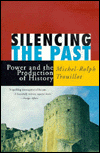 In Intro to History a very long time ago, if you didn't know the answer to a question, all you had to do was drop "epistemological significance" or "ontological content" into a sentence, and you were fine. In Silencing the Past: Power and the Production of History, Michel Trouillot incorporates both into a polemic on the nature of "truth," history, and cultural production.
In Intro to History a very long time ago, if you didn't know the answer to a question, all you had to do was drop "epistemological significance" or "ontological content" into a sentence, and you were fine. In Silencing the Past: Power and the Production of History, Michel Trouillot incorporates both into a polemic on the nature of "truth," history, and cultural production.A first half of the book is theory heavy, which is really cool. Trouillot highlights the differences between positivist and constructivist approaches to the field of history and narrative production. In the second half, he focuses on the Haitian Revolution, the Alamo, and the making of Columbus Day to illustrate his point about how power influences historicity -- he highlights in particular the roles of agency and structure in what he calls "silences," or the differences between "what happened" and "what is said to have happened."
In a sense, "silences" are inherent in the field of history, which relies on primary sources. In recording anything, certain details are always omitted. And Trouillot's "what happened" can only be "knowable" through very limited --and often conflicting-- lenses.
While discussing narrative formation, Troillot straddles the role of observer and participant pretty fluidly. His writing style alternates between personal stories and flashbacks, explanations of the process of historical production, and then his own interpretations.
Parts of the book were slower than others; and some were intuitive (duh, social structures like education influence who has access to recording and interpreting historical narratives). But overall it's a really good dive into questions about the role of the historian, how histories are created, and the social significance of the ensuing cultural battles.
I even ran to wikipedia to look up more about the Haitian Revolution.
No comments:
Post a Comment